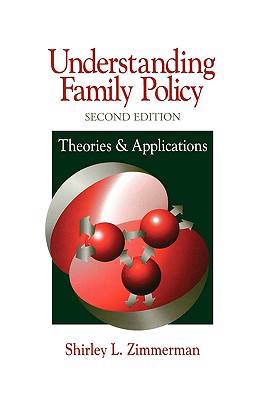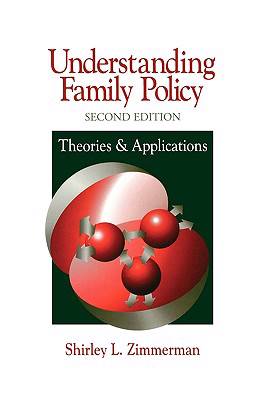
- Afhalen na 1 uur in een winkel met voorraad
- Gratis thuislevering in België vanaf € 30
- Ruim aanbod met 7 miljoen producten
- Afhalen na 1 uur in een winkel met voorraad
- Gratis thuislevering in België vanaf € 30
- Ruim aanbod met 7 miljoen producten
Zoeken
Understanding Family Policy
Theories and Applications
Shirley L Zimmerman, Zimmerman
Paperback | Engels
€ 253,45
+ 506 punten
Omschrijving
First, let me say that this edition is a wonderful expansion and thus an improvement on the first edition. The comprehensiveness of this new edition makes it a worthy addition to the literature and enables it to be the basis for an entire course. . . . I especially like the organization of the chapters vis-à-vis each other. Chapters 2, 3, and 5 will be especially beneficial to me and my students. They cover material that I covered in the past but I couldn′′t do a good job without having something for the students to read. I think this [focus and integration] is a strength of the book especially in chapters 2-7. Chapter 7 really ties things up nicely. Another strength of the book is its use of examples from recent policy debates to illustrate the concepts being discussed. In general, the text does a good job here [implications and applications] especially as the health care reform and welfare reform examples are included. --Ray Forgue, Chairman, Family Studies Department, University of Kentucky "I like this updated version of Understanding Family Policy and would definitely use it. . . . The approach taken in this edition has a more `universal′′ appeal in that it lays good groundwork to understanding family policy. . . . An excellent addition is the question section at the end of each chapter. It will help the student highlight important concepts covered and also provide a good start for discussion. . . . I think Dr. Zimmerman has done a great job of integrating the concepts, referring back to points made earlier, summarizing previous thoughts, and moving on to new ones. . . . The examples to illustrate points are good. . . . I have used Understanding Family Policy . . . and plan to use the new edition." --Catherine A. Solheim, Department of Family and Child Development, Auburn University "In the author′′s words, ′′this is a book about family policy and different ways of thinking about and its effects on families.′′ In this second edition, Shirley L. Zimmerman introduces new theoretical frameworks and applications that reinforce the link between family theory, policy, and practice. Also new to this edition are a glossary and a listing of study questions at the end of each chapter intended to stimulate discussion and to be adapted to readers′′ situations and work settings. The book, geared toward students in social work and family and policy studies, also provides examples from recent policy debates to illustrate its concepts." --Journal of Social Work Education Highly successful in its first edition, Understanding Family Policy, Second Edition introduces new theoretical frameworks as well as applications of theory. Shirley L. Zimmerman has incorporated the recent history of family policy and reinforced the link between theory and the everyday life experiences people have with the policy process. Also new to this volume are a glossary and study questions at the end of each chapter, useful for stimulating reflections and discussion on the book′′s twin subjects--families and family policy. Personal examples of policy research have been replaced with more generic and less time-bound examples. New topics include overriding issues: gender, race, ethnicity and culture, interest group theory, and other family frameworks for assessing family well-being including symbolic interaction, family stress, conflict, feminist and cultural theories. An excellent resource for offering conceptual tools for analyzing family problems, policies, and consequences, this second edition is essential for students and individuals in the areas of social work and family and policy studies.
Specificaties
Betrokkenen
- Auteur(s):
- Uitgeverij:
Inhoud
- Aantal bladzijden:
- 296
- Taal:
- Engels
Eigenschappen
- Productcode (EAN):
- 9780803954618
- Verschijningsdatum:
- 1/01/1995
- Uitvoering:
- Paperback
- Formaat:
- Trade paperback (VS)
- Afmetingen:
- 154 mm x 233 mm
- Gewicht:
- 480 g

Alleen bij Standaard Boekhandel
+ 506 punten op je klantenkaart van Standaard Boekhandel
Beoordelingen
We publiceren alleen reviews die voldoen aan de voorwaarden voor reviews. Bekijk onze voorwaarden voor reviews.











